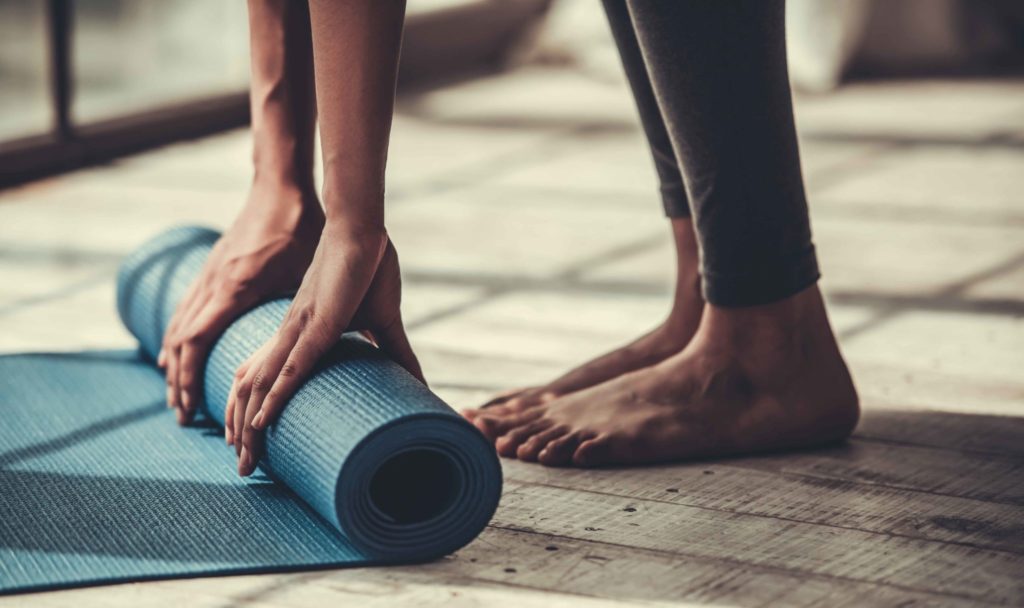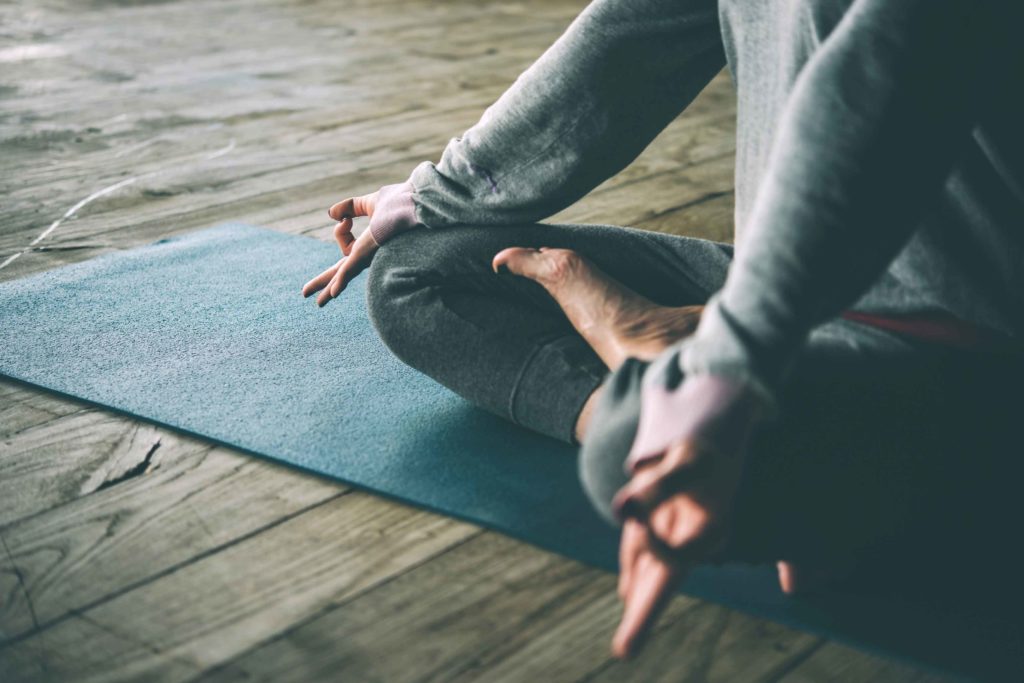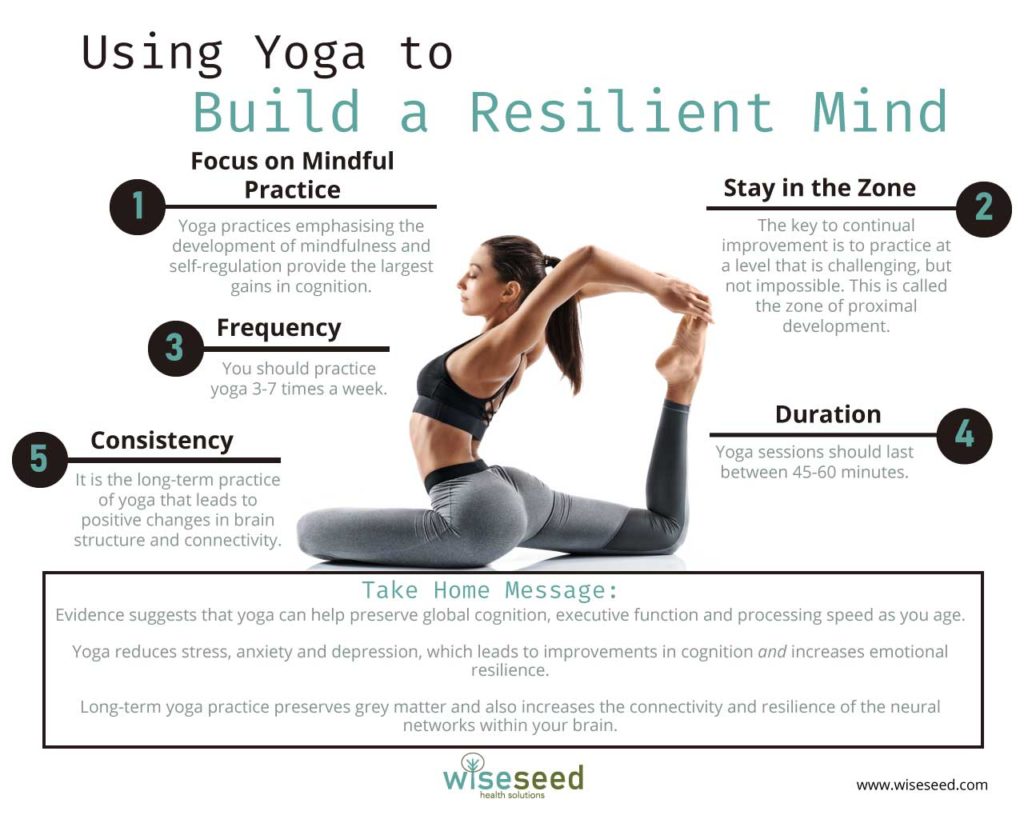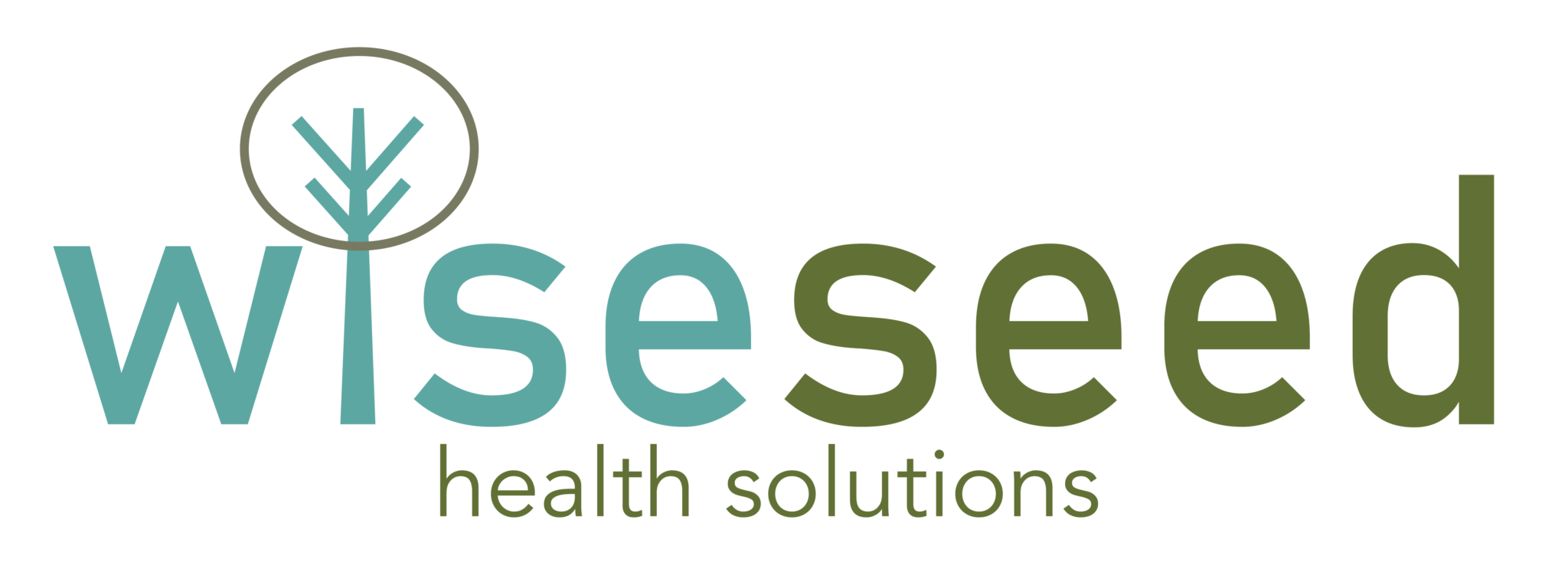Using Yoga to build a Resilient Mind

Yoga is good for your body and mind!
Continuing our exploration of the Mind Domain of everyday resilience, in this article I investigate how you can use yoga to improve your mind.
Yoga is a holistic activity that involves a combination of physical exercises, controlled breathing and meditation 1. It can be practiced in a gentle form that is suitable for the elderly, but it can be increased in intensity to satisfy the most elite of athletes. This makes yoga a highly effective and popular approach for people seeking to improve their physical well-being , athleticism and mobility.
Less well appreciated is the power of yoga to improve your mind. Fortunately, an increasing number of researchers are investigating how yoga can be used as an effective approach to maintain, and even improve, your cognitive function.
Here, I briefly look at the evidence supporting yoga as a method for maintaining and improving human cognition. I then provide five practices that you can use to improve your own yoga practice to help you to get the most cognitive bang for your yoga buck!
Domains of Intelligence Improved by Yoga
Global cognition
Global cognition uses a battery of tests that measure different aspects of your intelligence to generate an overall score that summarises your global cognition. The tests measure the various forms of cognition including memory, logic, visuospatial abilities, and processing speed.
Executive Function
Executive function is made up of three cognitive domains that together make it possible for you to plan, manipulate information, and multi-task. The three cognitive domains that make up your executive function are:
Working memory, which governs your ability to retain and manipulate distinct pieces of information over short periods
Fluid intelligence, which endows you with the mental flexibility that helps you to develop novel solutions to new problems
Inhibitory control, which enables you to set priorities to resist impulsive actions or responses. It is inhibitory control that allows you to switch mental gears when you jump from one task to another.
Processing Speed
Processing speed is the time it takes you to perform a cognitive function. The higher your processing speed, the more efficiently you can think and learn.
Evidence that yoga improves cognitive function and reduces cognitive decline
An early study found that long-term yoga practitioners experienced significantly fewer lapses in executive function compared to people who don’t practice yoga 2. Subsequent studies have further supported the ability of yoga practice to improve cognitive function in adults. For example, one study found that the long-term practice of yoga preserved fluid intelligence in middle-aged yoga practitioners 3. A second, independent study showed that an eight-week yoga intervention performed with community-dwelling older adults improved both their working memory and inhibitory-control 4. Taken together, these three studies revealed that yoga practice can maintain and possibly even improve executive function in adults.

A series of follow-up studies have strengthened the link between yoga practice and improved cognitive function. Independent studies have shown that yoga interventions in older adults can improve working memory 5, verbal memory 6 visuospatial processing, and processing speed 7.
Four recent reviews have thoroughly analysed the ability of yoga practice to preserve cognitive function. Chan et al found that yoga practice improved executive function and processing speed 8. Wu et al found that yoga practice improved global cognition, fluid intelligence, processing speed, and a mild improvement in working memory 9. Chen et al found that yoga improves the three domains that make up executive function 10. Finally, Chobe et al found that yoga improves attention, executive functions and memory 11.
Thus, research to date identifies yoga as a safe and effective intervention to help you maintain your cognitive power.
How Does Yoga Improve Cognition?
Yoga indirectly improves cognition by reducing stress, anxiety and depression
It’s well known that stress, anxiety and depression work together to reduce your ability to think clearly 12. It’s also well known that yoga decreases anxiety 13, depression 14, stress 15, making you more emotionally resilient and improving your overall quality of life and well-being 16.
Is it possible that simply by helping you control your everyday levels of stress, anxiety and depression, yoga also increases your cognitive function? The early evidence says: yes!
For example, a reduction in the stress hormone cortisol and self-reported markers of stress were strongly correlated with cognitive improvements in Hatha yoga participants 5. Further, Kirtan Kriya yoga meditation simultaneously reduced depression while improving verbal memory in older adults 6.
Together, these studies support the idea that yoga improves cognition, at least in part, by reducing your levels of stress, anxiety and depression.
Yoga directly preserves and possibly improves cognition through changes in brain structure, connectivity and resilience
Yoga Increases Grey Matter Volume
Grey matter is primarily made up of the cell bodies of the neurons in your brain 17. Grey matter volume decreases with age, and the loss of grey matter volume is likely a driver of age-related cognitive decline 17.
Long-term yoga practice is known to preserve grey matter volume in adults. For example, in 2012 it was shown that long-term yoga practice increased the grey matter volume in brain regions known to be involved in executive function 2. Further, Hernández et al found that long-term yoga practitioners have statistically significant larger grey matter volume across the whole brain 18. They also showed that the areas with the most preservation of grey matter volume are those areas associated with sustained attention/cognitive control, emotion control, sensing the state of your body, and feelings of compassion 18. More recently, it was shown that yoga practitioners also have higher grey matter volume in brain regions associated with learning and working memory 19.
Yoga Increases the Connectivity and Resilience of Your Neuronal Network
The Default Mode Network (DMN) is a large neural network that is most active when you are not engaged in the outside world but are involved in wakeful rest. Broadly speaking, the DMN is involved in the neurobiological basis of self, thinking about others, remembering the past, and thinking about the future.
Early work revealed that yoga practitioners had greater network integrations between different neural structures and the default mode network 3. Further, the neural networks of yoga practitioners are more resilient then non-yoga study participants 3. The Author’s extended these findings in a subsequent study, where they showed that yoga practitioners have greater connectivity between the caudate, a brain region involved in learning and inhibition control, and other regions of the brain 20.
These exciting findings gained further support in a more recent study performed by a second, independent research group in 2019 21. Here, it was revealed that Hatha Yoga practitioners who practiced for a minimum of twice a week for at least eight years show greater neural network connectivity within the default mode network of the brain 21. The take-home message from these studies is clear, yoga practice increases the number and resilience of neural connections between different regions of the brain.
How to practice yoga for maximal improvements in cognition
We know that yoga can improve human cognition. The million-dollar question is: How do you practice yoga for maximal cognitive improvement? Below, I offer five practical suggestions for how to best use yoga to improve your mind.
Make mindfulness and spiritual practice the focus of your yoga practice.
It’s likely that yoga practices emphasising the development of self-regulation provide the largest gains in cognition.
Therefore meditation, self-regulation and integration should become a primary focus of your yoga practice if you want to maximise your cognitive development. Thus, be sure to prioritise the following in your yoga practice:
Pratyahara or sensory withdrawal, with a focus on relaxation, inward focus and minimising sensory input.
Dharana or concentration, with a focus on effortful, single-point focused attention
Dhyana or meditation, with a focus on an unbroken flow of attention; and finally
Samadhi or integration, merging subject and object, self-realisation, aiming for transcendental consciousness.
These practices should be supported by Asana (postures) and Vinyasa (breath-linked movement of poses) because it’s the combination of meditation with movement that makes yoga so effective.

Practice at the limit of your abilities: stay in the zone of proximal development.
As we have outlined previously, the key to continual improvement is to continually practice at a level that is very challenging, but not impossible. This is called the zone of proximal development. The bottom line is that you have to work hard to get the best results from your yoga practice. Stay in the zone.
Practice consistently
The analyses of multiple yoga trials have made it clear that practicing yoga 3-7 times a week is best for improving cognitive function.
Practice for 45-60 minutes at a time.
The analyses of the trials done to date also show that optimal Yoga practice sessions last between 45-60 minutes.
Make yoga practice a permanent part of your lifestyle.
Comparisons between yoga practitioners and control groups consistently show that the positive changes in brain structure correlate with the number of years the person has practiced yoga. Thus, it is the long-term practice of yoga that leads to positive changes in brain structure and connectivity.
Conclusion
Evidence is growing that the combination of movement, control, concentration, meditation, and ethics that is available to practicing Yogis can maintain and even improve key aspects of cognition. This is because yoga helps you control stress, anxiety, and depression, which increases your ability to think and perform at your best. Furthermore, long-term yoga practice has been shown to preserve the structure of your brain and increase the connectivity of your neural networks. This, in turn, helps protect your precious cognitive abilities against the ravages of old age.
Please click on the link below to download the free PDF!

References and Further Reading
1 Taimni, I. K. The science of yoga. (Quest Books, 1961).
2 Froeliger, B., Garland, E. L. & McClernon, F. J. Yoga meditation practitioners exhibit greater gray matter volume and fewer reported cognitive failures: results of a preliminary voxel-based morphometric analysis. Evidence-Based Complementary and Alternative Medicine 2012 (2012).
3 Gard, T. et al. Fluid intelligence and brain functional organization in aging yoga and meditation practitioners. Frontiers in Aging Neuroscience 6, 76 (2014).
4 Gothe, N. P., Kramer, A. F. & McAuley, E. The effects of an 8-week Hatha yoga intervention on executive function in older adults. Journals of Gerontology Series A: Biomedical Sciences and Medical Sciences 69, 1109-1116 (2014).
5 Gothe, N. P., Keswani, R. K. & McAuley, E. Yoga practice improves executive function by attenuating stress levels. Biol Psychol 121, 109-116, doi:10.1016/j.biopsycho.2016.10.010 (2016).
6 Eyre, H. A. et al. Changes in neural connectivity and memory following a yoga intervention for older adults: a pilot study. Journal of Alzheimer’s Disease 52, 673-684 (2016).
7 Gothe, N. P., Kramer, A. F. & McAuley, E. Hatha yoga practice improves attention and processing speed in older adults: results from an 8-week randomized control trial. The Journal of Alternative and Complementary Medicine 23, 35-40 (2017).
8 Chan, J. S., Deng, K., Wu, J. & Yan, J. H. Effects of meditation and mind-body exercises on older adults’ cognitive performance: a meta-analysis. The Gerontologist 59, e782-e790 (2019).
9 Wu, C. et al. Effects of mind‐body exercises on cognitive function in older adults: A meta‐analysis. Journal of the American Geriatrics Society 67, 749-758 (2019).
10 Chen, F. T. et al. Effects of Exercise Training Interventions on Executive Function in Older Adults: A Systematic Review and Meta‑Analysis. Sports Medicine (Auckland, NZ) (2020).
11 Chobe, S., Chobe, M., Metri, K., Patra, S. K. & Nagaratna, R. Impact of Yoga on cognition and mental health among elderly: A systematic review. Complementary Therapies in Medicine, 102421 (2020).
12 Prenderville, J. A., Kennedy, P. J., Dinan, T. G. & Cryan, J. F. Adding fuel to the fire: the impact of stress on the ageing brain. Trends Neurosci 38, 13-25, doi:10.1016/j.tins.2014.11.001 (2015).
13 Kirkwood, G., Rampes, H., Tuffrey, V., Richardson, J. & Pilkington, K. Yoga for anxiety: a systematic review of the research evidence. Br J Sports Med 39, 884-891 (2005).
14 Uebelacker, L. A. et al. Hatha yoga for depression: critical review of the evidence for efficacy, plausible mechanisms of action, and directions for future research. Journal of Psychiatric Practice® 16, 22-33 (2010).
15 Chong, C. S., Tsunaka, M. & Chan, E. P. Effects of yoga on stress management in healthy adults: a systematic review. Alternative Therapies in Health and Medicine 17, 32 (2011).
16 Oken, B. S. et al. Randomized, controlled, six-month trial of yoga in healthy seniors: effects on cognition and quality of life. Alternative Therapies in Health and Medicine 12, 40 (2006).
17 Sowell, E. R. et al. Mapping cortical change across the human life span. Nat Neurosci 6, 309-315, doi:10.1038/nn1008 (2003).
18 Hernández, S. E., Suero, J., Barros, A., González-Mora, J. L. & Rubia, K. Increased grey matter associated with long-term sahaja yoga meditation: a voxel-based morphometry study. PLoS One 11, e0150757 (2016).
19 Gothe, N. P., Hayes, J. M., Temali, C. & Damoiseaux, J. S. Differences in brain structure and function among yoga practitioners and controls. Frontiers in Integrative Neuroscience 12, 26 (2018).
20 Gard, T. et al. Greater widespread functional connectivity of the caudate in older adults who practice kripalu yoga and vipassana meditation than in controls. Frontiers in Human Neuroscience 9, 137 (2015).
21 Santaella, D. F. et al. Greater anteroposterior default mode network functional connectivity in long-term elderly yoga practitioners. Frontiers in Aging Neuroscience 11, 158 (2019).
Disclaimer
The material displayed on this website is provided without any guarantees, conditions or warranties as to its accuracy.
Information written and expressed on this website is for education purposes and interest only. It is not intended to replace advice from your medical or healthcare professional.
You are encouraged to make your own health care choices based on your own research and in conjunction with your qualified practitioner.
The information provided on this website is not intended to provide a diagnosis, treatment or cure for any diseases. You should seek medical attention before undertaking any diet, exercise, other health program or other procedure described on this website.
To the fullest extent permitted by law we hereby expressly exclude all warranties and other terms which might otherwise be implied by statute, common law or the law of equity and must not be liable for any damages whatsoever, including but without limitation to any direct, indirect, special, consequential, punitive or incidental damages, or damages for loss of use, profits, data or other intangibles, damage to goodwill or reputation, injury or death, or the cost of procurement of substitute goods and services, arising out of or related to the use, inability to use, performance or failures of this website or any linked sites and any materials or information posted on those sites, irrespective of whether such damages were foreseeable or arise in contract, tort, equity, restitution, by statute, at common law or otherwise.

Ten Minutes is All You Need
Research has shown that ten minutes of moderate-to-vigorous exercise performed each day is enough to significantly reduce your risk of early death.

Ten Minutes is All You Need
Research has shown that ten minutes of moderate-to-vigorous exercise performed each day is enough to significantly reduce your risk of early death.


